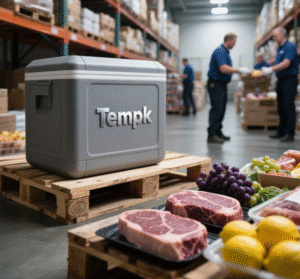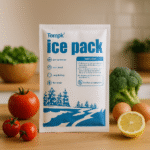Schachtel Trockeneis ist ein leistungsstarkes Werkzeug zur Aufrechterhaltung extrem kalter Temperaturen während des Versands oder der Lagerung. Ideal, um verderbliche Güter gefroren zu halten, Trockeneis bietet mehrere Vorteile gegenüber traditionellem Eis. In diesem Artikel, Wir werden untersuchen, wie Trockeneis funktioniert, seine Verwendung, und Best Practices zum sicheren Umgang und Packen sicher.

Was ist Trockeneis und wie funktioniert es??
Trockeneis ist die feste Form von Kohlendioxid (Co₂), Ein Gas, das natürlich in der Atmosphäre existiert. Es ist viel kälter als normales Eis, mit einer Temperatur von etwa -109,3 ° F (-78.5°C). Im Gegensatz zu normalem Eis, Trockeneis schmilzt nicht in Wasser. Stattdessen, Es untermauert, Direkt in Gas verwandeln, Dies macht es zu einer effizienten und saubereren Kühloption.
Wie Trockeneis von normalem Eis unterscheidet
-
Temperatur: Trockeneis ist weitaus kälter als normales Eis, Halten Sie Ihre Artikel länger eingefroren.
-
Keine Flüssigkeit: Als Trockeneis untermauert, Es lässt kein Wasser zurück, Verringerung von Chaos und Verhinderung einer feuchten Verpackung.
-
Dauer: Trockeneis dauert viel länger als normales Eis, Besonders wenn richtig gepackt.
| Besonderheit | Trockeneis | Normales Eis | Auswirkungen auf das Packen |
|---|---|---|---|
| Temperatur | -109.3° F (-78.5°C) | 32° F (0°C) | Trockeneis hält Kühler viel kälter. |
| Dauer | 24-48 Std. | 4-6 Std. | Trockeneis dauert länger, Reduzierung des Bedarfs an häufigen Ersatz. |
| Rückstand | NEIN | Ja (Wasser) | Trockeneis lässt keinen Rückstand, Im Gegensatz zu normalem Eis. |
So verwenden Sie eine Schachtel Trockeneis zum Versand und Lagerung?
Schritt 1: Wählen Sie die richtige Box
Beim Kauf einer Schachtel Trockeneis, Stellen Sie sicher, dass es speziell für die sichere Handhabung und den Versand ausgelegt ist. Suchen Sie nach isolierten Kisten mit ordnungsgemäßer Belüftung, Da Trockeneis Sublimat und Gas freisetzen muss. Eine luftdichten Box kann Druckanbau verursachen, was zu Unfällen führen kann.
Schritt 2: Trockeneis sicher behandeln
Tragen Sie immer Handschuhe oder verwenden Sie Zangen beim Umgang mit Trockeneis, um Erfrierungen zu vermeiden. Es ist auch wichtig, es in gut belüfteten Räumen zu verwenden, um CO₂-Aufbau zu verhindern, das kann in begrenzten Bereichen schädlich sein.
Schritt 3: Verpackung mit Trockeneis
Beim Packen einer Schachtel mit Trockeneis, Legen Sie es immer auf die Gegenstände, um sie auf die niedrigstmögliche Temperatur zu halten. Verwenden Sie Isoliermaterialien wie Schaum, um das Trockeneis von Lebensmitteln oder anderen empfindlichen Gegenständen zu trennen. Lassen Sie Niemals Trockeneis direkt mit Lebensmitteln in Kontakt kommen.
Schritt 4: Richtige Versiegelung
Versiegeln Sie die Schachtel sicher, Aber lassen Sie kleine Belüftungslöcher, damit das Gas entweichen kann. Stellen Sie sicher, dass der Inhalt eng gepackt ist, um Bewegung zu verhindern, Dies könnte dazu führen, dass das Trockeneis zu schnell sublimieren.
Anwendungen einer Schachtel Trockeneis
Für verderbliche Lebensmittelversand
Eine Schachtel Trockeneis eignet sich ideal für den Versand gefrorener Lebensmittel oder temperaturempfindliche Gegenstände wie Meeresfrüchte, Fleisch, und Milchprodukte. Es stellt sicher, dass Ihre Artikel während der langen Versandzeiten eingefroren bleiben, Verderb verhindern.
Für medizinische und pharmazeutische Sendungen
Trockeneis wird üblicherweise verwendet, um biologische Proben zu versenden, Impfungen, und andere temperaturempfindliche medizinische Produkte. Die Fähigkeit, extrem niedrige Temperaturen aufrechtzuerhalten.
Für Spezialeffekte und Kühlsysteme
Trockeneis wird auch für Theatereffekte verwendet, wie es einen rauchigen Schaf macht, nebelähnliche Atmosphäre beim Sublimieren. Zusätzlich, Es wird in bestimmten Industrie- und Laboranwendungen für Kühl- und Gefrierzwecke verwendet.
Wie viel Trockeneis brauchen Sie?
Die erforderliche Menge an Trockeneis hängt von der Größe Ihrer Box ab und wie lange Sie die Gegenstände benötigen, um kalt zu bleiben. Typischerweise, Für 24-Stunden-Versand, Sie werden da brauchen 5-10 Pfund Trockeneis für einen Standardkühler. Für längere Dauer oder größere Sendungen, Sie brauchen mehr.
Verpackungstipp: Trockeneis schichten
Beginnen Sie mit normalem Eis oder einer Isolierschicht unten, gefolgt von Trockeneis darüber. Dies ermöglicht es, zuerst die empfindlichsten Gegenstände zu erreichen, während der noch eine kontrollierte Umgebung für den Rest der Sendung aufrechterhalten.
Trends im Trockeneiskonsum in 2025
Steigende Nachfrage nach Trockeneis bei der Schifffahrt
Wie E-Commerce- und Online-Lebensmittellieferungen weiter wachsen, Die Nachfrage nach temperaturempfindlichen Versandmethoden steigt. Trockeneis bietet eine zuverlässige Lösung für den Versand verderblicher Waren über lange Strecken.
Innovationen bei Trockeneisverpackungen
In 2025, Es werden neue Verpackungsmaterialien und -designs entwickelt, um die Verwendung von Trockeneis zu optimieren. Fortgeschrittene isolierte Behälter und bessere Versiegelungsmechanismen tragen dazu bei, die Haltbarkeit verderblicher Güter zu verlängern und gleichzeitig die Sicherheit während des Transports zu verbessern.
FAQ – Häufige Fragen zur Verwendung einer Schachtel Trockeneis
Q1: Kann trocknen Eis in regulären Versandkästen verwendet werden?
Ja, Trockeneis kann in regulären Versandkästen verwendet werden, solange sie isoliert und ordnungsgemäß belüftet sind. Stellen Sie sicher, dass Sie Platz für die Gasausdehnung lassen.
Q2: Wie lange dauert Trockeis in einem Kühler??
Trockeneis kann dauern 24-48 Stunden abhängig von der Größe des Kühlers, die Isolierung, und externe Temperaturen.
Q3: Ist trockeneis sicher zu handhaben?
Trockeneis ist beim Tragen von Handschuhen sicher zu handhaben und die richtige Belüftung sicherzustellen. Berühren Sie es niemals direkt mit nackter Haut.
Abschluss
Die Verwendung einer Schachtel mit Trockeneis ist eine der effektivsten Möglichkeiten, um verderbliche Güter während des Versands oder der Lagerung kalt zu halten. Mit den richtigen Vorsichtsmaßnahmen und den richtigen Verpackungstechniken, Trockeneis stellt sicher. Behandeln Sie es immer sicher und packen Sie es für die besten Ergebnisse richtig ein.
Nächster Schritt: Wenn Sie planen, temperaturempfindliche Artikel zu versenden, Erwägen Sie, Trockeneis zu verwenden, um sicherzustellen, dass sie kalt und frisch bleiben. Befolgen Sie unbedingt alle Anweisungen zur Handhabung und Packung, um eine maximale Effizienz zu erhalten.
Über Tempk
Und Tempk, Wir bieten hochwertige Verpackungslösungen an, einschließlich isolierter Kisten für einen optimalen Trockeneiskonsum. Unsere Produkte sind so konzipiert, dass Ihre Artikel kalt und sicher halten, Stellen Sie sicher, dass sie in perfektem Zustand ankommen. Kontaktieren Sie uns für weitere Informationen zu unseren temperaturgesteuerten Verpackungslösungen.
Maßnahmen ergreifen: Für fachmännische Ratschläge zur Verwendung von Trockeneis in Ihren Sendungen, Machen Sie sich noch heute mit unserem Team in Verbindung!























